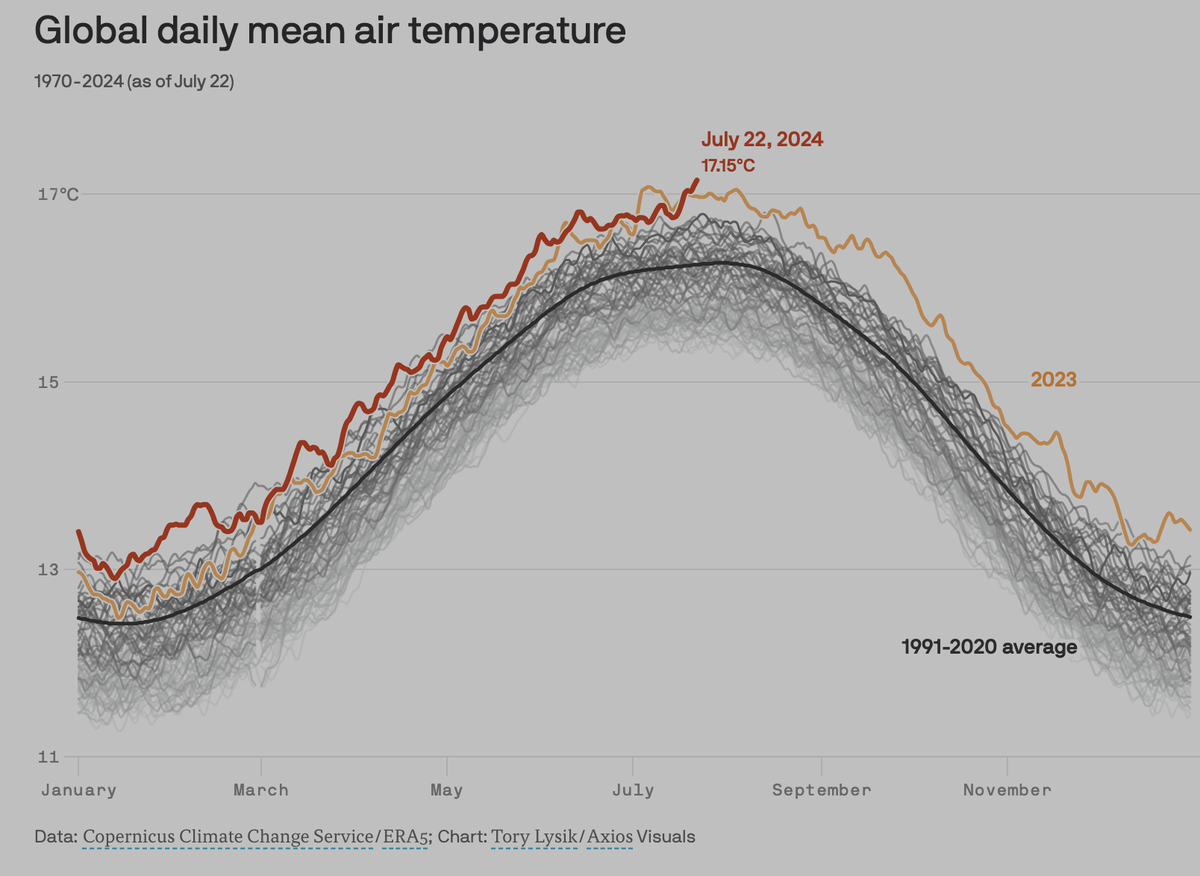The Green Page:

Earth Likely Just Had Its Hottest Two Days In Thousands Of Years:
According to the Copernicus Climate Change Service in Europe, on July 21 and 22, Earth experienced its warmest two days globally since at least 1940.
Threat level: "We are now in truly uncharted territory, and as the climate keeps warming, we are bound to see new records being broken in future months and years," Copernicus director Carlo Buontempo said.
The big picture: The records, which exceeded the old milestone set last July, very likely stands as the hottest day in thousands of years, based on tree ring records, ice cores and other paleoclimate data.
- The past 13 months have been the warmest on record, and the oceans have been at record-warm levels for 15 straight months.
- This is especially noteworthy because the planet's oceans absorb about 90% of the trapped heat from the human-caused buildup of greenhouse gases in the atmosphere.
Zoom in: The new data is preliminary but reliable, according to Copernicus and outside researchers.
- The daily global average temperature hit 17.09°C on July 21, just above the 17.08°C recorded on July 6, 2023.
- Then, on 22 July, the temperature hit 17.15°C, besting Sunday's record.
- The data comes from a technique known as reanalysis, in which data from ships, buoys, surface weather stations, satellites, and other sources are crunched and calculated in near real-time.
- The European data is viewed as accurate, with other reanalysis data sets in use elsewhere tending to closely match one another despite using independent methods. This lends confidence in the results.
Between the lines: The global average temperatures since the summer of 2023 have been starkly higher than what came before them, and scientists are still researching why.
- Before July 2023, the previous daily record was set on Aug. 13, 2016. But since July 3, 2023, there have been 57 days that have exceeded that previous record, Copernicus stated in a press release.
- An El Niño climate cycle in the tropical Pacific Ocean last year would tend to increase global average temperatures somewhat. However, that factor fails to account for all of the warming that has been observed.
By the numbers: Copernicus researchers found that the 10 years with the highest daily average temperatures occurred between 2015 and 2024.
- The difference between the highest daily average temperature in 2015, the coolest year on that list, and the 2024 record is sizable, at about 0.3°C.
- The climate is swiftly moving closer to the most stringent warming limit under the Paris climate agreement, which aimed to hold climate change to under 1.5°C above preindustrial levels.
- Hypotheses range from reduced aerosol emissions to a switch to different marine shipping fuels to a volcanic eruption in 2022, as well as an unsettling, human-caused speedup in the pace of global warming.
Yes, but: The July 21 record may be beaten in coming days, since the annual maximum global average temperature tends to occur between late June and early August.
What they're saying: "What is truly staggering is how large the difference is between the temperature of the last 13 months and the previous temperature records," Copernicus' Buontempo said.
- "It's certainly a worrying sign coming in the heels of 13 straight record-setting months," climate scientist Zeke Hausfather told Axios via email.
According to him, based on year-to-date temperatures, there's about a 92% chance that 2024 will beat 2023 as the warmest year on record, though upcoming months may exhibit some signs of cooling due to ocean and atmosphere conditions across the tropical Pacific Ocean.
- Hausfather, the climate research lead at Stripe, said climate scientists value long-term temperature changes more than daily fluctuations.
- "Daily global temperatures are real and physically meaningful but are highly variable on a weekly basis," he said.
- "We should focus more on monthly, annual, and even longer-term temperature changes when looking for a signal from human-driven climate change."
What's next: Due to the continued emissions of planet-warming greenhouse gases, more warming is expected through midcentury. But decisions that global leaders and ordinary citizens make now about energy, transportation, food systems, and deforestation will determine how significantly the world warms after that.

